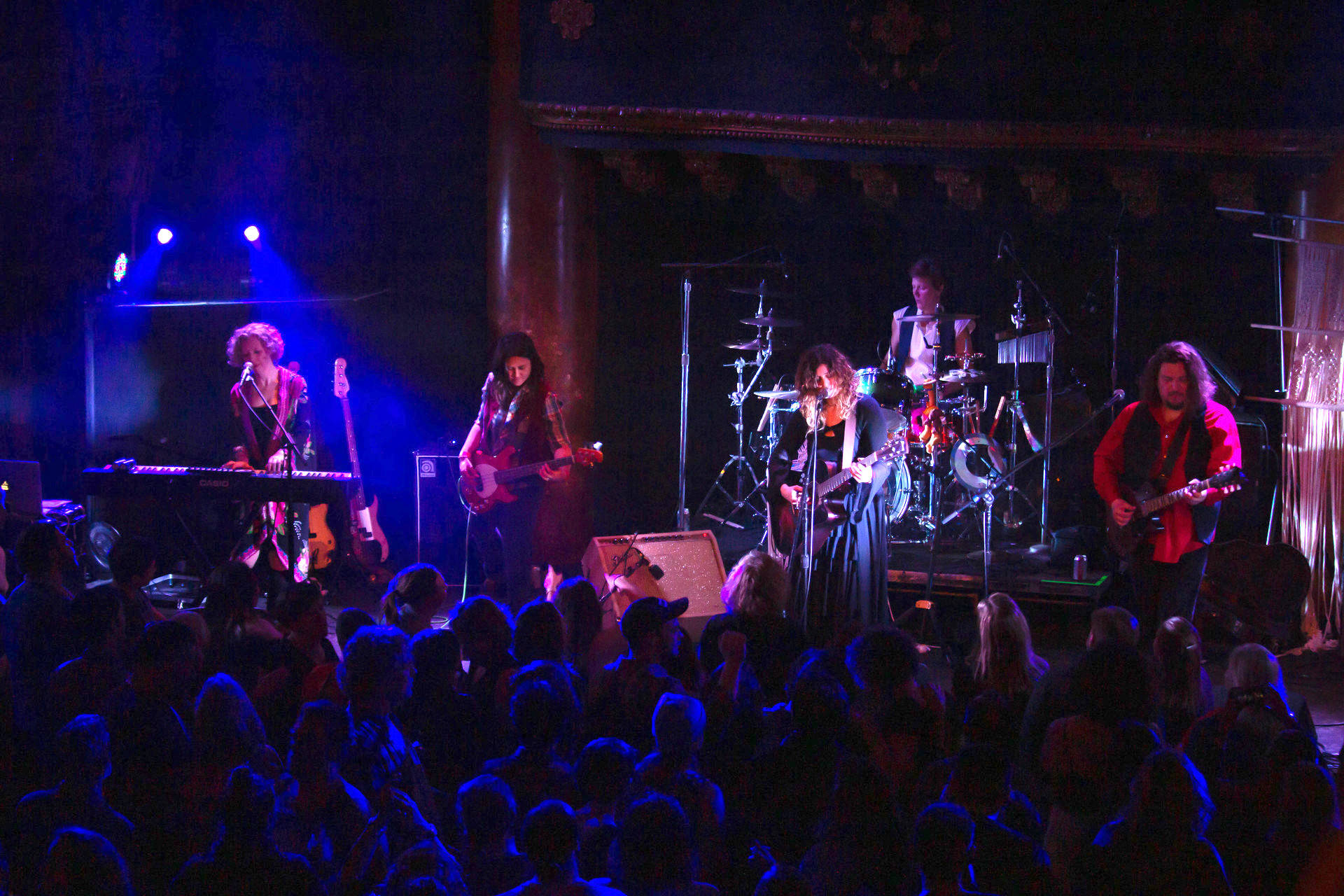Dressed in a black lace dress — with a macramé mandala draped across her band's keyboard — Linda Moody takes the stage to channel her inner witch.
"Now, I know you guys are going to sing along to this one," she croons into her microphone.
Moody plays Stevie Nicks in Fleetwood Macramé, a Bay Area-based Fleetwood Mac tribute band. Whether they're booming through the Great American Music Hall or crammed into the tiny upstairs of Oakland's Elbo Room, Fleetwood Macramé's shows feel both intimate and electric as fans scream-sing along to classics that first came out in the 1970s. Songs like "Go Your Own Way" and "The Chain" were on heavy rotation 40 years ago and they still are today.
Fleetwood Mac's tunes flood the radio, and play everywhere from car commercials to the dentist's office. The music has also made its way to a younger generation of superfans who weren't even alive during the "Rumours"-era peak of Fleetwood Mac's fame. Nonetheless, they seem to have claimed the music as their own, as if they're uncovering it for the first time.
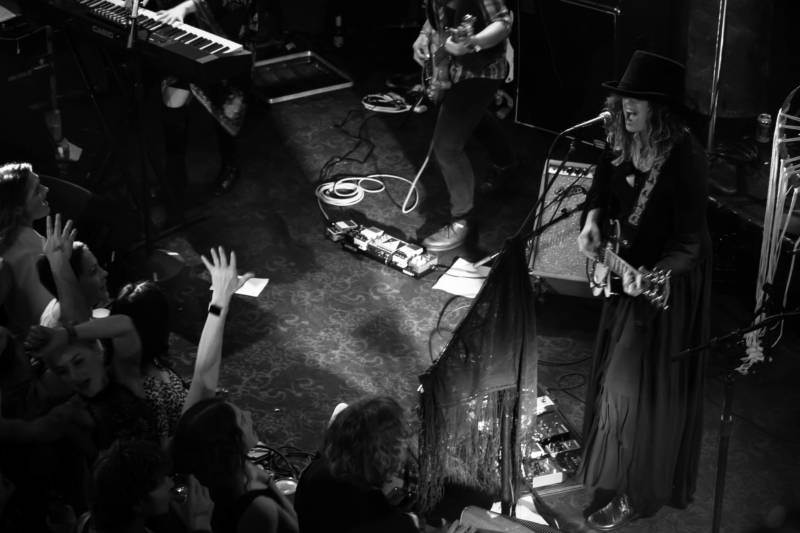
According to a 2018 article on Digg, there was a 58% uptick in Fleetwood Mac listening among millennials on Spotify over a two-year period. The members of Fleetwood Macramé say they see this trend reflected in their own audience.
"These 20-somethings come to our shows and know every word, know every song," says Kirsten Shallenberg, singer and keyboardist of Fleetwood Macramé. "And they wax rhapsodic with one of us afterwards about how deep the lyrics are, how beautiful it is, and how much it means to them."
Why has Fleetwood Mac's music boomeranged back into the public consciousness? Or, better yet, what is behind Fleetwood Mac's persistent mega-popularity?
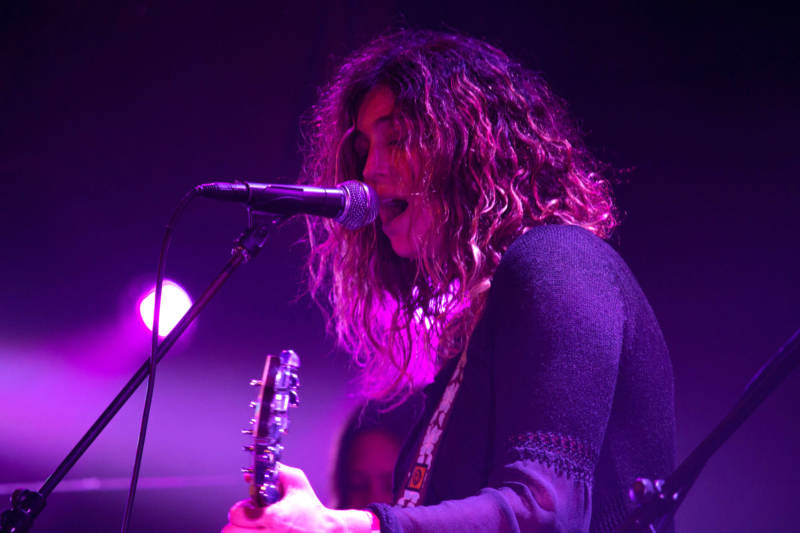
'People Get to Relive What the Songs Mean to Them'
"Dreams unwind / Love's a state of mind," frontwoman Linda Moody serenades the crowd at the Great American Music Hall during a show in February, draping her face with a sheer black shawl. As the song picks up, she seems to be convulsing with occult spirituality.
Moody might resemble Stevie Nicks, but Fleetwood Macramé is not a tribute band that simply mimics its inspiration. Rather, band members say they want to emulate the spirit of Fleetwood Mac while offering an intimate real-life setting for people to experience the music.
"I see our band as camp song leaders," says Moody. "When we invite everybody to pretend they're in the band with us, they get to relive what the songs mean to them."
According to Moody, it was evident from Fleetwood Macramé's beginnings back in 2016 that the music casts a spell on concertgoers. She says people were singing and crying throughout their very first show. But by the end of the night, scores of them approached Moody to share memories about what the music means to them: stories of how Fleetwood Mac reminds them of parents who have passed away, or how a love of the music offered a commonality for family members with fraught relationships.
Fleetwood Macramé says that these strong reactions to the music have persisted since the tribute band formed three years ago.
"Every show, we all get accosted, loved up, happily approached by so many people who really want to look one of us in the eye and tell us how magical and important that experience was for them," says keyboardist Shallenberg, who began playing with the band in 2017. "It's different reasons, but it happens at every show."
'It’s the Soundtrack to My Childhood'
As the band's frontwoman, Moody empathizes with the strong sense of nostalgia that Fleetwood Mac's music evokes.
"It's the soundtrack of my childhood," she says. She even shows me a little shrine in her room at home, sitting across from a photo of Stevie Nicks tacked to her wall. Moody recalls singing songs like "Gypsy" into her hairbrush as a girl. The song has since held her hand through some of her darkest moments.
"That explains why people in the audience are crying hearing these songs, because they mean so much," says Moody. "And if you're a musician or if you're a big fan of music like I am, music has saved your life.”
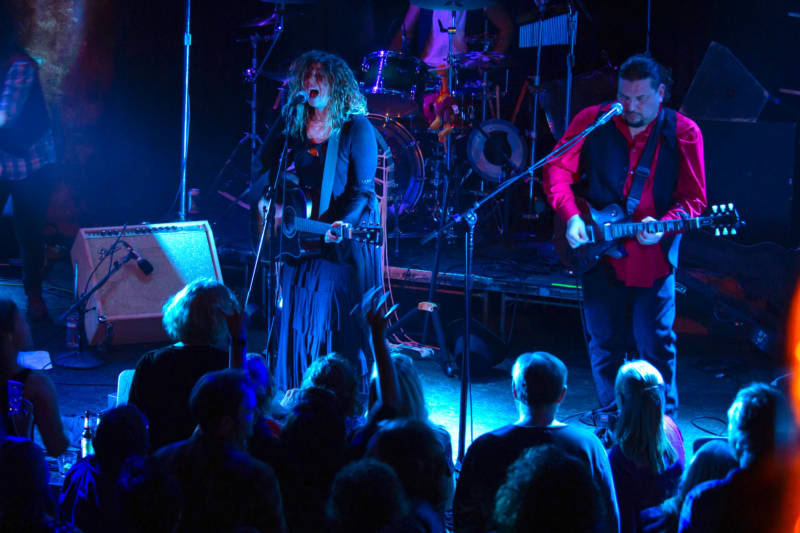
'It Makes You Feel More Human'
Fleetwood Macramé honors the full spectrum of Fleetwood Mac's catalog with zealous commitment. Though it varies from show to show, the roster covers ballads for the brokenhearted like "Silver Springs," howling rock tunes like "Big Love" and upbeat bops like "Don’t Stop."
"There’s something special about the combination of songs that express anger and heartbreak, and then songs about the possibility of love or loving yourself," says Shallenberg.
She says the assortment of songs allows listeners to ride a wave of emotions, granting people permission to feel love, rage, and hope — all in the same night.
"It's not just party music. It's not just sad music," she says. "It really is a roller coaster. It makes you feel more human."
'Our Shows Provide This Big Sense of Community'
The therapeutic nature of the music not only offers an emotional outlet for concertgoers, but also allows the band to forge deep connections with fans like Lisa "Binky" Merigian, who you can find air drumming in the front row.
"I'm a superfan," says Merigian. "I'm like a Fleetwood Macramé superfan."
Merigian comes to every Fleetwood Macramé show with her mom, Diane Payne, who lost her home during the Camp Fire that devastated Paradise last November. Payne has attended roughly a dozen Fleetwood Macramé shows since moving to San Rafael to live with her daughter.
"I think this makes you feel good," says Payne. "The crowd gets into it, sings along, and it just lifts you up."
"This has been an amazing healing process for her," agrees Merigian, who says the audience has taken Payne under its wing. "They look out for her on the dance floor. They make sure she's not getting trampled, they bring her water. And the band has adopted her like their mom.”
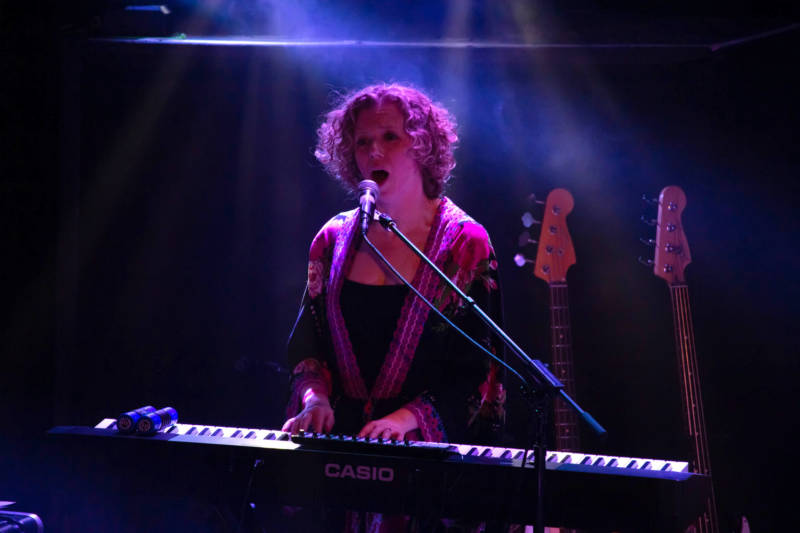
Keyboardist Shallenberg believes the music offers refuge during life’s difficult moments, or when the world feels uncertain. Moreover, she theorizes that Fleetwood Mac’s music — and the band's shows in particular — provide a safe space in today's increasingly volatile political climate.
"America feels more unsure than it has in the past," says Shallenberg, noting that the younger generation is likely feeling the impact especially keenly.
"There's a lot of stressful, unpleasant things happening," says Shallenberg. "But I wonder if coming to a show, singing Fleetwood Mac, putting your arms around your community and singing together is a way to let some of that go."
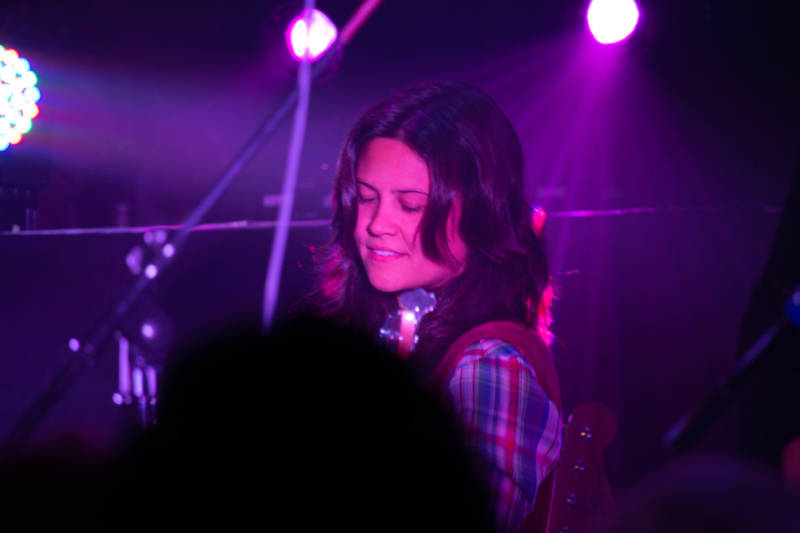
'That Sort of Witchiness Is Very Alive in the Lesbian Community'
Bassist Tori Fulkerson-Jones believes that a rekindled Fleetwood Mac obsession is tied to a current cultural zeitgeist of witches and tarot cards. She suspects that our political climate has reignited a spiritual awakening similar to that of the '60s and '70s, and so the younger generation returns to music of that time.
Indeed, Stevie Nicks has long served as a bewitching emblem of feminism for people young and old. To unleash your inner Stevie is to embrace the most mystical, strange, unapologetically femme version of yourself — even if that version vows to haunt her ex-lovers. ("I'll follow you down til' the sound of my voice will haunt you / You'll never get away from the sound of the woman that loves you")
"[Stevie Nicks] is powerful. She's expressing femininity, but not in a way that looks weak," explains Moody. "I think it's that sort of witchiness is very alive in the lesbian community."
Just as Nicks has long been a beloved queer icon, Fleetwood Macramé itself has always had a strong queer membership. They agree that the music's universal lyrics — and ambiguous gender pronouns — lend themselves to misfits, outsiders and young people embracing their sexuality.
"For people that are experiencing the world different from the mainstream, there's a lot of space in her music to see yourself and the possibility of yourself without being boxed in by certain words or certain perspectives," says bassist Fulkerson-Jones.
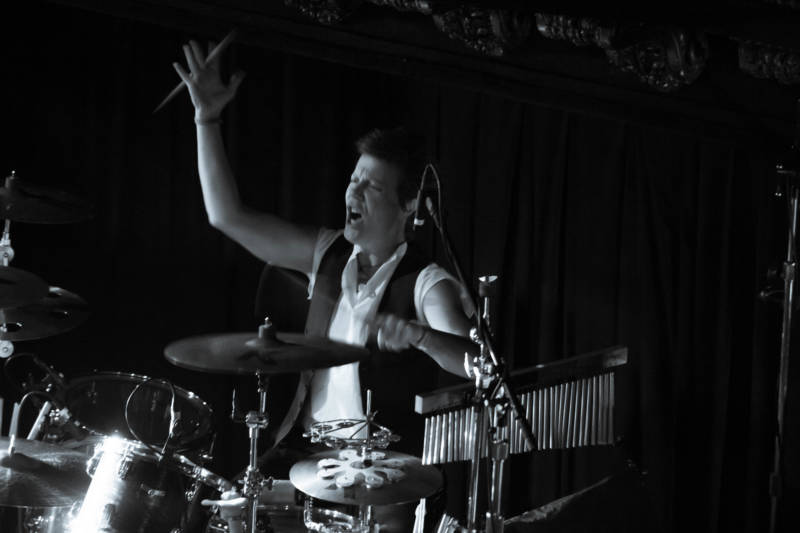
Drummer Jai Bird Carrell says the music takes her back to being a queer kid growing up in the Midwest and Texas.
"I didn't see a lot of people who looked like me," says Carrell. "I never saw anybody that looked like me, or talked like me, acted like me, or maybe felt like me. I didn't feel like I identified with anybody."
Through breakups and life's low moments, Carrell says Fleetwood Mac’s music served as a catalyst for self-growth and self-love.
"Fleetwood Mac has been my best friend," she says. "I found my identity with that band. It has a universal message, but it speaks to everyone no matter where you come from or your walk of life."
The message, she says, is to "be who you are."
'You Really Should Cry'
The versatility of Fleetwood Mac's appeal manifests through the diverse crowds that Fleetwood Macramé attracts: tech dudes in the Richmond, lesbians in Berkeley, gay men in the Mission.
The crowds may differ, "but the thing that ties everything together is that the crowd is all holding hands and crying and singing 'Landslide' together," says Moody.
Moody introduces "Landslide," the grand finale of the show at the Great American Music Hall, by encouraging the audience to join together. "I feel like this music really brings everybody together, and it feels like family," Moody calls into the crowd. "I hope you’ll sing with us."
"Landslide" makes you feel like you’re being wrapped in one of Stevie's silk shawls. It hits home for the vast range of Fleetwood Macramé audience members, including Tanner Smith, a young classic rock fan who works a marketing job in San Francisco. He saw the original Fleetwood Mac live in Washington, D.C., a few years ago.
"I was just sitting here with this vat of popcorn and they started playing 'Landslide,' " he says. "And I started crying into my popcorn."
Smith insists that he doesn't typically lose his composure while listening to Fleetwood Mac, but concedes that there's magic in the music. Drummer Carrell agrees.
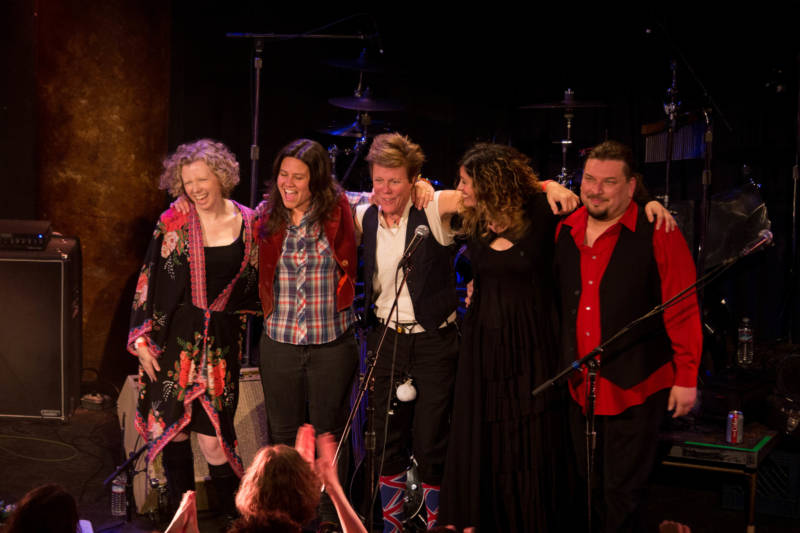
"You really should cry," says Carrell. "If you don't, something's wrong."
She says that by the end of the night fans are linked arm in arm in a circle that extends onstage, swaying and singing at the top of their lungs.
"It's goosebumps good," she says.
I think the music resonates because whoever you are, no matter what life's thrown at you, you'll find yourself reflected in these lyrics. You take this love — here at this show — and you take it down into everyday life. Here tonight, Fleetwood Macramé holds space for anyone in search of crystal visions and a sprinkle of gold dust.
